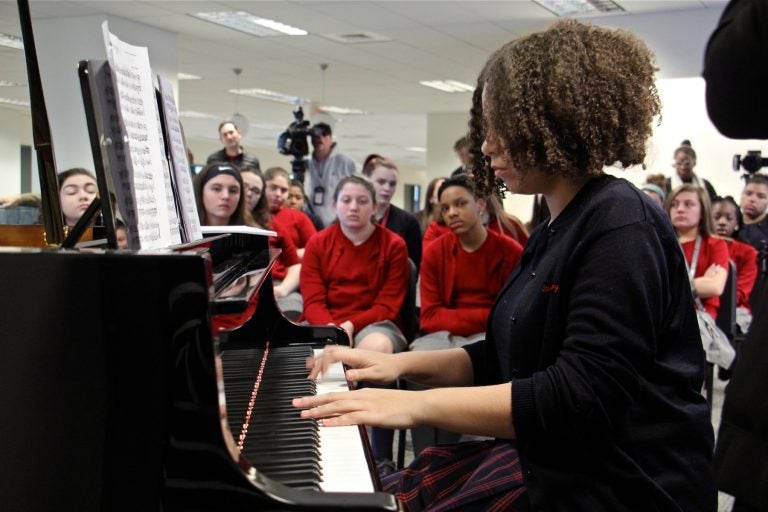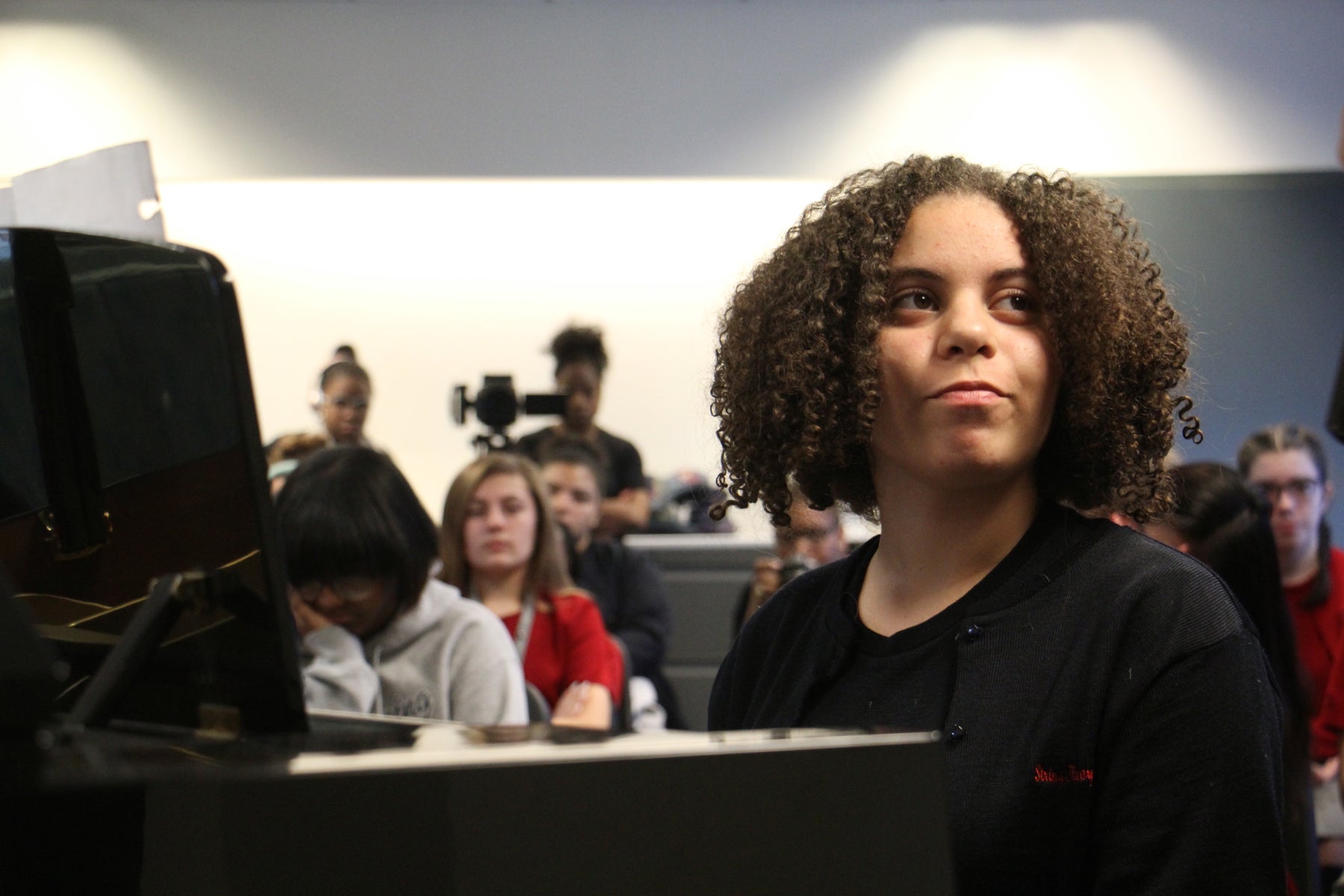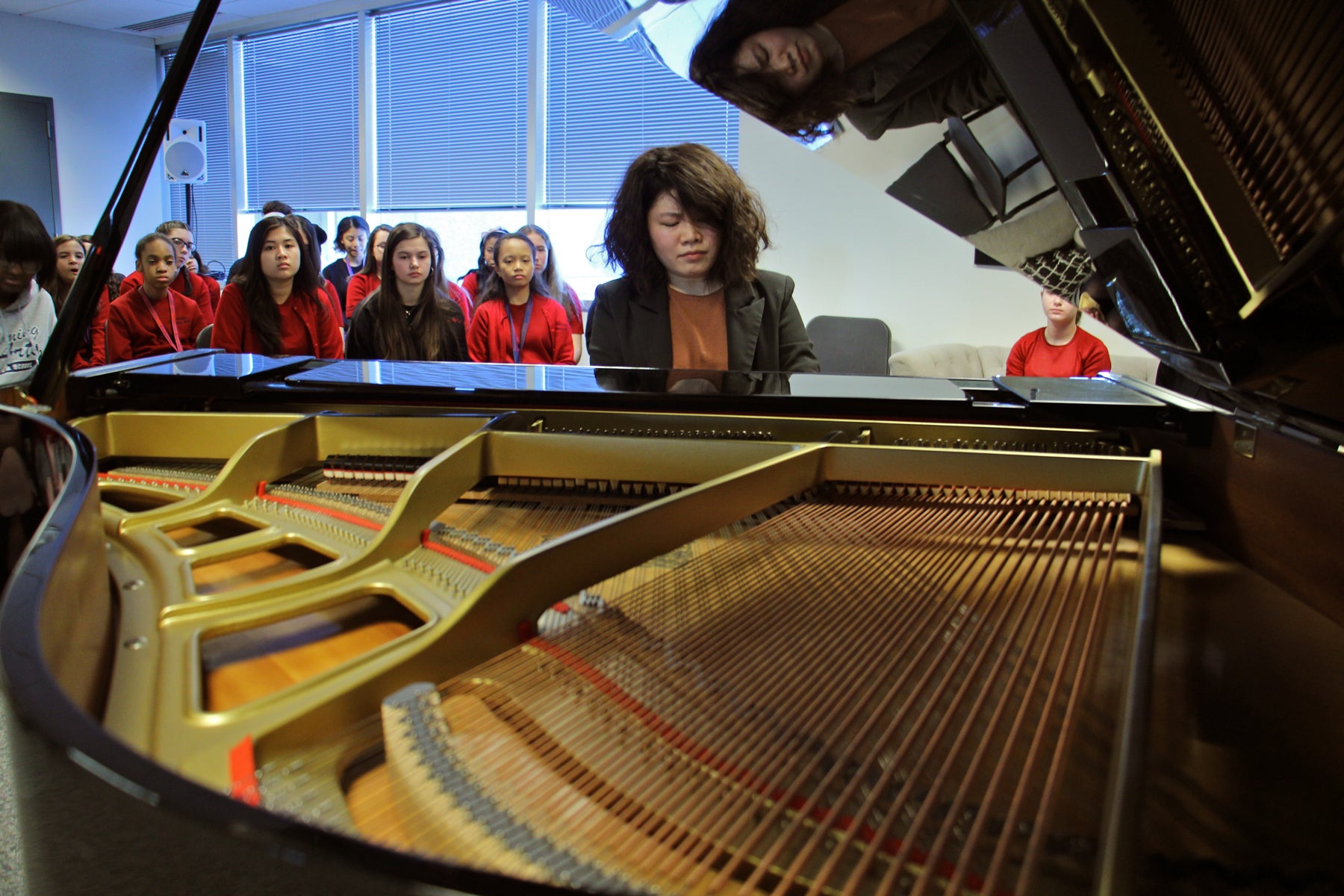Puerto Rican prodigy finds a piano in Philly
After fleeing hurricane devastation, a young pianist gets back on the ivories in Philadelphia.

Puerto Rican piano prodigy Paola Calderon performs during a master class at Philadelphia Performing Arts String Theory School. The 14-year-old relocated to Philadelphia in November after Hurricane Maria devastated Puerto Rico. (Emma Lee/WHYY)
Earlier this year, 14-year-old Paola Calderone was living in Puerto Rico with her mother, her older brother, and a piano on which she practiced every day.
That was before the hurricanes.
The storms that devastated the island also wiped out Paola’s access to a piano. While her home was spared the ravages of the hurricanes, her school was destroyed.
“Even if it was open, I couldn’t get there. No public transportation,” she said of her former high school. “No trains. No buses.”
The storm also took away the family income. Her mother makes a living as a baker, specializing in cakes, but that job disappeared with the hurricane.
“Nobody had any money to buy cakes,” said Paola.
With little else to keep them on the island, the Calderone family came to Philadelphia to live with a relative shortly before Thanksgiving. Paola arrived with no friends, no winter clothes, and no piano. Her older brother started to call schools to get her enrolled somewhere, midterm.
“The call happened to come to my office,” said Illene Valez, administrative assistant at String Theory Charter School in Philadelphia. “I knew that if a student was displaced from Puerto Rico and wanted to attend a school here, we would have to take them.”

Since the hurricanes struck Puerto Rico in the fall, thousands of students fled into Pennsylvania, including several hundred to Philadelphia. The state Department of Education has advised all schools to make efforts to accommodate the influx of displaced citizens, including special services normally extended to homeless students in accordance with federal law.
In Paola’s case, she was able to snag an opening in String Theory Charter and begin immediately at the school that normally accepts students by lottery from among the thousands who apply.
String Theory, with a music program focused on orchestra, does not offer students piano instruction. There is, however, a grand piano in a carpeted lobby on the eighth floor outside the school’s administrative offices.
Principal Jack Carr allows Paola to use the piano for practice. The first time she sat to play, one of the administrators with an office adjacent to the lobby assumed somebody was playing a classical CD.
“We’re not teaching her piano here, because we don’t teach that as an instrument,” said Carr. “But I recommended places for her to go for lessons outside, and we let her practice here because she doesn’t have a piano yet.”
Carr was grateful to accept a piano prodigy in his school. As the founder of GAMP — the Girard Academic Music Program — he wants to bolster String Theory’s music program. It helps to have talent in his student body.

On Thursday, Paola performed a short recital as part of a master class taught by visiting artist Zhenni Li, a rising classical soloist on the roster of the Astral artist development organization. She chose to play an old favorite, a sonata by Joseph Haydn.
“I haven’t practiced in a while because of the hurricane,” she said. “I don’t have a piano, and I don’t have a teacher, so that was the best piece at the moment I had.”
The class featured Paoloa and classmate Isabella Palamara, the school’s other serious pianist. Li was impressed by their talent.
“The music reading is already perfect,” said Li, herself a recent transplant to Philadelphia. “I just had to add some musical insights of my own.”
Li urged the girls to go beyond the page, and color the notes with drama. She explained the composer, Haydn, would sometimes break up a melody with phrases that seem to meander.
“In music we call it modulation. It’s when you change keys. Now, we’re in a minor key. Almost. But we don’t know. He keeps moving,” she told the class of a few dozen girls. “You want to keep people wondering: Where is Paola going?”
Now that Paola has access to a piano again, she wants to spend time learning a new piece, by Mozart. Ultimately, she said, she wants to be a doctor.
WHYY is your source for fact-based, in-depth journalism and information. As a nonprofit organization, we rely on financial support from readers like you. Please give today.





